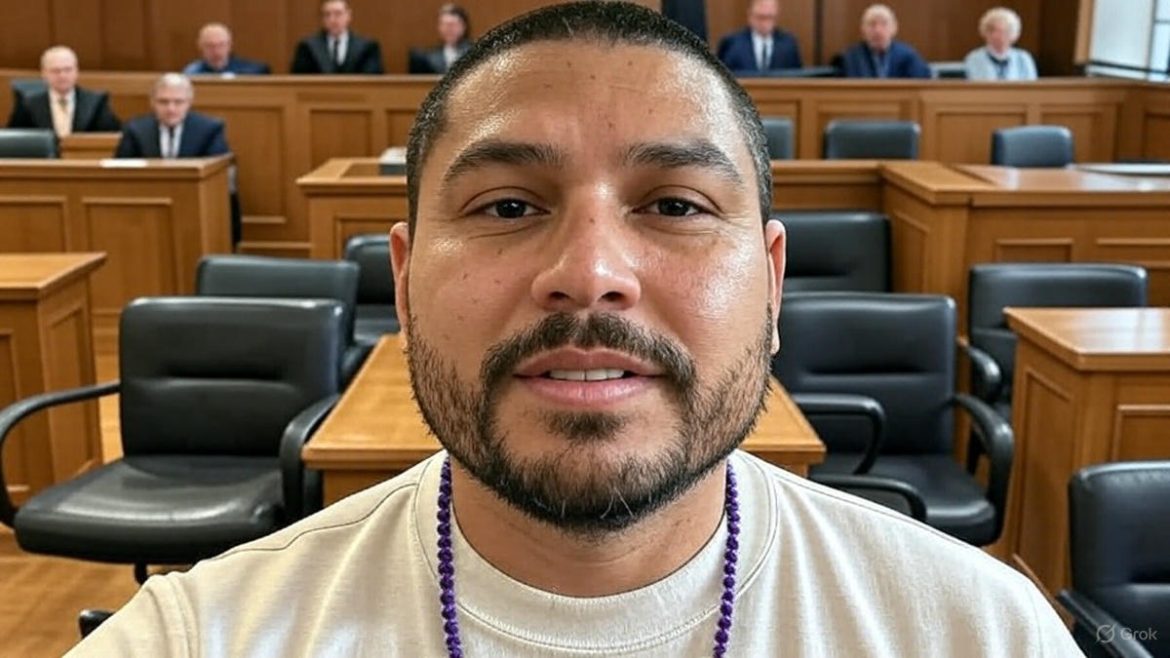In a dramatic turn of events in Orange County, California, a twice-deported illegal immigrant convicted of a deadly drunk driving crash faces new federal charges that could keep him behind bars for decades. Oscar Eduardo Ortega-Anguiano, a Mexican national, was set for early release from a California prison after serving just over three years of a 10-year sentence for the 2021 deaths of two 19-year-old teens, Anya Varfolomeev and Nicholay Osokin. However, intervention by the White House and swift action by federal prosecutors have halted his release, spotlighting tensions over immigration enforcement and sanctuary state policies.
Ortega-Anguiano’s case dates back to November 2021, when he, under the influence of drugs and alcohol, crashed into the young couple’s car at nearly 100 mph on the 405 Freeway in Orange County. The impact caused the vehicle to burst into flames, killing Varfolomeev and Osokin, who were burned alive. The couple, both 19 and in a relationship, had their lives tragically cut short, leaving their families devastated. Ortega-Anguiano, who had a history of offenses including driving without a license, was convicted in 2022 of two counts of gross vehicular manslaughter while intoxicated. He received two concurrent 10-year sentences, a decision that Orange County prosecutors opposed, arguing for the maximum penalty.
The California Department of Corrections and Rehabilitation (CDCR) had scheduled Ortega-Anguiano for parole eligibility in July 2025, a move that would have seen him released after serving less than half his sentence. This decision, based on California’s classification of his crime as “non-violent” under state law, sparked outrage among the victims’ families and caught the attention of federal authorities. Anatoly Varfolomeev, Anya’s father, expressed his disgust to Fox News, stating, “It’s disgusting. You have two young, unbelievable future, productive American citizens killed for nothing, and that illegal immigrant who already has been deported twice is going to be released again? For what?”
The White House, under President Donald Trump’s administration, intervened swiftly upon learning of the planned early release. White House Press Secretary Karoline Leavitt condemns the situation as emblematic of a broken immigration system, emphasizing that Ortega-Anguiano, who had been deported in 2013 and again prior to the crash, was allowed to re-enter the U.S. during the Biden administration. Leavitt asserts that it is outrageous for violent criminal aliens to be released early, and the administration is committed to ensuring Ortega-Anguiano remains detained. The White House is now collaborating with California Governor Gavin Newsom to ensure compliance with federal immigration authorities.
On April 23, 2025, U.S. Attorney for the Central District of California, Bilal A. Essayli, announces that his office has filed a felony immigration charge against Ortega-Anguiano under 8 USC 1326 for illegal re-entry after deportation. If convicted, he faces up to 20 additional years in federal prison. Essayli, a Republican appointed by Attorney General Pam Bondi earlier this month, states on X, “If the State of California will not seek the full measure of justice against this individual, the Justice Department will.” This charge follows a detainer placed by Immigration and Customs Enforcement (ICE) in 2022, which ensures that if Ortega-Anguiano is released from state custody, ICE will take him into federal custody for deportation proceedings.
Governor Newsom’s office, facing criticism over California’s sanctuary policies, confirms on X that the CDCR will coordinate with ICE to transfer Ortega-Anguiano before any potential release, a practice they claim to have followed with over 10,000 inmates. Newsom’s statement also points to a Republican district attorney in Orange County who, they allege, offered Ortega-Anguiano a plea deal instead of pursuing second-degree murder charges. Orange County D.A. Todd Spitzer counters this narrative, clarifying that the plea was made directly to the court over prosecutors’ objections, and the judge sentenced Ortega-Anguiano under California law, which has prioritized the rights of criminals over victims for years.
The case has reignited debates over California’s sanctuary state policies, established in 2017 under Governor Jerry Brown, which limit local law enforcement’s cooperation with federal immigration authorities. While the Biden administration restored law enforcement grants to sanctuary cities in 2021, the Trump administration has consistently sought to overturn such policies, viewing them as a barrier to public safety. Border Czar Tom Homan, speaking on Fox News, vows that ICE will arrest and deport Ortega-Anguiano if California fails to honor the detainer, stating, “I will work with Secretary Noem on this case, and I guarantee you, if they don’t honor the detainer, we’ll have ICE agents outside that facility to take custody of this individual and deport him.”
Public sentiment, as reflected in posts on X, shows widespread frustration with California’s handling of the case, with many users describing the state as “unrecognizable” under Newsom’s leadership and calling for stricter penalties for criminal immigrants. Advocacy groups, however, argue that focusing on high-profile cases like Ortega-Anguiano’s fuels anti-immigrant sentiment, pointing to studies showing that immigrants, including those undocumented, do not commit crimes at higher rates than native-born Americans.
As of April 24, 2025, Ortega-Anguiano remains in state custody, with his fate hinging on the federal immigration charge and ICE’s detainer. The case underscores the ongoing clash between state and federal authorities over immigration enforcement, a tension that has persisted through multiple administrations. During Trump’s first term, ICE deported 2.1 million immigrants, while the Biden administration oversaw 1.1 million deportations from 2021 to early 2024, often focusing on border returns rather than interior removals. Trump’s current administration has deported over 100,000 illegal migrants since January 20, 2025, signaling a renewed crackdown that could further impact cases like Ortega-Anguiano’s.
For the families of Varfolomeev and Osokin, the federal intervention offers a glimmer of hope for justice, but their grief remains raw. The outcome of this case may set a precedent for how California and other sanctuary states navigate the Trump administration’s aggressive immigration enforcement agenda, with implications for thousands of other immigrants facing similar charges.



